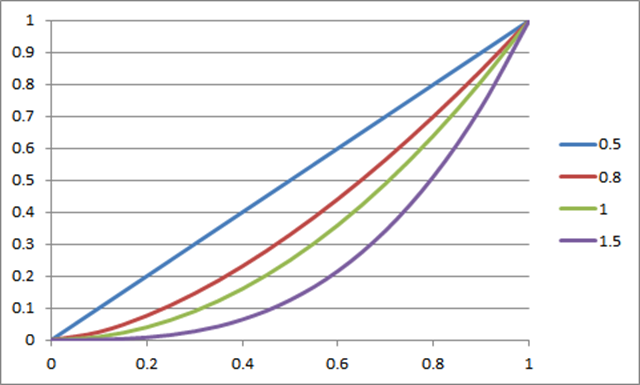Android animation interpolator: acceletate
AccelerateInterpolator:
y = t^(2f)
f值越大效果越明顯,開始時緩慢,接近結束會迅速移動
Demo:
Source:
@HasNativeInterpolator
public class AccelerateInterpolator extends BaseInterpolator implements NativeInterpolatorFactory {
private final float mFactor;
private final double mDoubleFactor;
public AccelerateInterpolator() {
mFactor = 1.0f;
mDoubleFactor = 2.0;
}
/**
* Constructor
*
* @param factor Degree to which the animation should be eased. Seting
* factor to 1.0f produces a y=x^2 parabola. Increasing factor above
* 1.0f exaggerates the ease-in effect (i.e., it starts even
* slower and ends evens faster)
*/
public AccelerateInterpolator(float factor) {
mFactor = factor;
mDoubleFactor = 2 * mFactor;
}
public AccelerateInterpolator(Context context, AttributeSet attrs) {
this(context.getResources(), context.getTheme(), attrs);
}
public AccelerateInterpolator(Resources res, Theme theme, AttributeSet attrs) {
TypedArray a;
if (theme != null) {
a = theme.obtainStyledAttributes(attrs, R.styleable.AccelerateInterpolator, 0, 0);
} else {
a = res.obtainAttributes(attrs, R.styleable.AccelerateInterpolator);
}
mFactor = a.getFloat(R.styleable.AccelerateInterpolator_factor, 1.0f);
mDoubleFactor = 2 * mFactor;
setChangingConfiguration(a.getChangingConfigurations());
a.recycle();
}
public float getInterpolation(float input) {
if (mFactor == 1.0f) {
return input * input;
} else {
return (float)Math.pow(input, mDoubleFactor); // y = t^2f, default f=1, mDoubleFactor=2
}
}
@Override
public long createNativeInterpolator() {
return NativeInterpolatorFactoryHelper.createAccelerateInterpolator(mFactor);
}
}
